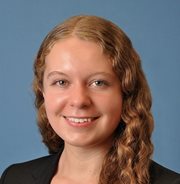Abigail Schulz

Abigail is a fourth-year medical student at the University of Illinois College of Medicine at Peoria. Raised in the Chicago suburbs, she graduated from Illinois Institute of Technology with her BS in Chemistry in 2020. After her first year of medical school, Abigail received an IDSA G.E.R.M. award to investigate the spatial distribution of tick-borne pathogens in North Carolina, which solidified her passion for vector-borne disease and sparked her interest in malaria. In addition, she has also served on her hospital's COVID-19 pandemic communications team and conducted research on pediatric COVID-19 therapeutics. Abigail will be applying into residency in internal medicine-pediatrics, with aspirations of providing direct patient care and conducting infectious diseases research in a resource-limited setting in her future career. In her free time, Abigail enjoys Irish dancing, long hikes and volunteering as a mentor in her community.

Prevention of malaria after severe flooding in rural western Uganda: A cluster randomized controlled trial
Bugoye Health Centre III
Uganda
What does the Kean Fellowship mean to you?
The Kean Fellowship is an honor and a blessing as it provided the financial means for me to spend over two months immersed in the local culture, language, and healthcare system of Uganda. The experiences and global connections I was able to build have given me a clearer vision for how I anticipate integrating global health into my career, and I am truly grateful to the ASTMH for choosing to invest in my future.
What do you anticipate learning?
The Kean Fellowship allowed me to gain direct experience in conducting malaria research in a rural, mountainous region of western Uganda. Yet, beyond just collecting data, I learned how to integrate the community's insight into research questions, assess the feasibility of a proposed solution in a resource-limited setting, and engage village leaders in scientific efforts. The fellowship also gave me a better understanding of the state of healthcare in rural Uganda. For example, visiting a child's home after being discharged for malaria or accompanying them to the clinic for a follow-up visit illuminated the financial, geographic and cultural barriers that individuals in this region face in accessing healthcare. Because of the opportunity to work closely with families, I learned how to better advocate for the health of not just communities, but also each individual patient and family I care for. Lastly, the opportunity to participate in a healthy, mutually beneficial research partnership between US and Ugandan scientists taught me how global health efforts can be used to strengthen local communities.
What interests you about tropical medicine and what problems are you interested in solving?
My interest in tropical medicine is rooted in a longstanding passion for infectious diseases, specifically vector-borne disease. Through my prior research work and now the Kean Fellowship, I've grown to love the multidisciplinary perspective that vector-borne disease research requires. Tackling a disease like malaria requires you to operate at intersection of medicine, climate, geography, public policy and human behavior—a challenge that I've found to be exciting and meaningful.
Yet, what draws me to pursue this work in tropical regions is a desire to advance health equity in infectious diseases. While many infectious diseases in sub-Saharan Africa are highly treatable and preventable, challenges such as poor health literacy, geographic constraints, and financial disadvantages amplify the burden of these diseases. I see research in tropical medicine as a way to advocate for those who lack the resources to advocate for themselves, ultimately creating sustainable systems that empower local communities. While I am undecided on what specific disease will be the focus of my research efforts in my career, I aspire to continue improving the care of patients with infectious diseases in Africa, both through research and clinical care.